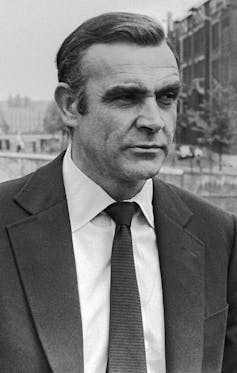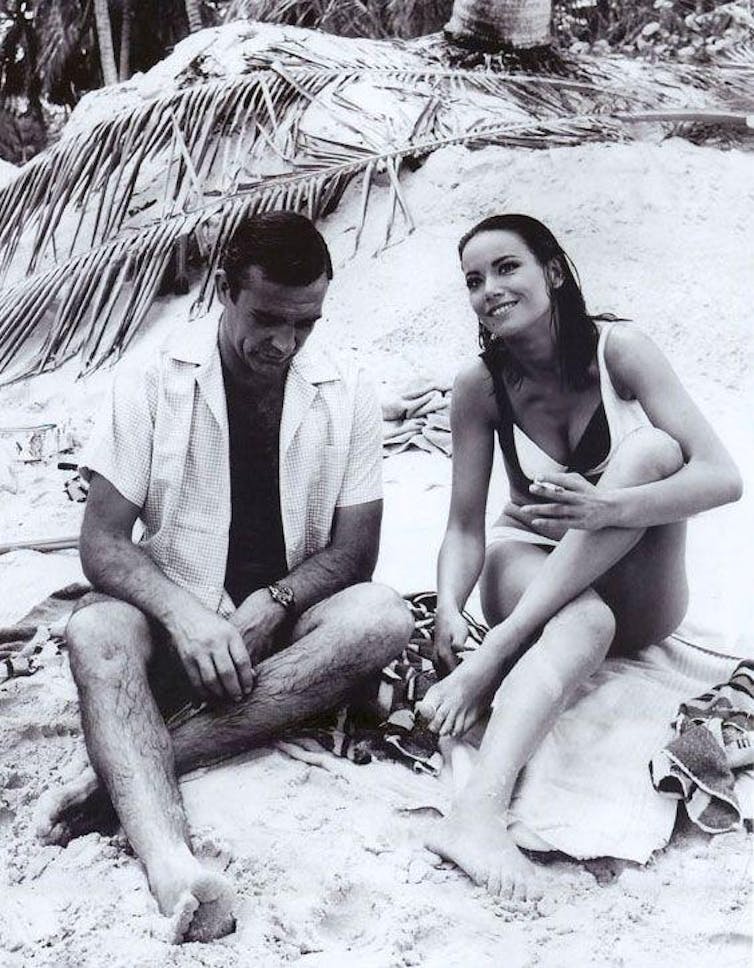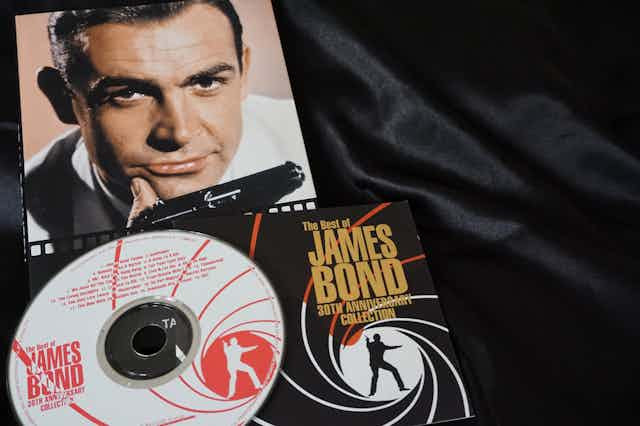Obituaries for Sean Connery all over the world remind us of what a versatile actor he was, starring in films as diverse as Alfred Hitchcock’s 1964 Marnie and Brian de Palma’s 1987 The Untouchables. But it is the character of James Bond, which he allegedly came to hate, that film fans will inevitably associate with the rugged features of the Scottish actor who first played the role in Dr. No in 1962.

Connery’s Bond embodied the postwar ideal of masculinity, a complex mix of old-fashioned charm and tough virility, loyalty to “Queen and Country”, and relaxed sexual mores. Raymond Mortimer wrote at the time, in his review of Fleming’s On Her Majesty’s Secret Service (1963): “James Bond is what every man would like to be, and what every woman would like between her sheets.”
Like his literary incarnation, the cinematic Bond launched by Connery caused disdain and thrilled audiences of both sexes in equal measures. Reviewing Goldfinger, film critic Nina Hibbin remained unimpressed by the Bond formula of “constantly lurking viciousness, and the glamorisation of violence … the carefully timed peaks of titillation and the skilfully contrived sensationalism”. Meantime, the late Honor Blackman, who played alongside him in Goldfinger, described working with Connery as “romping about on international locations with the sexiest man ever seen on screen”.
Connery’s Bond may get his Savile Row suit dirty, but he never loses his cool. Ruthless with his enemies, he’s not afraid of hurting many a female villain who threatens the success of his missions. He’s also, of course, an irresistible lover, able to seduce even those, like Pussy Galore, who claim “immunity” to his charms.
But is there more to Connery’s Bond than backward machismo and dubious race politics? Here are my top five Connery Bond films, and why you may want to watch them again:
1. Goldfinger (Guy Hamilton, 1964)
A beautiful woman whose spectacular death, and gold-painted lifeless body – remains, for better or worse, one of the most iconic images in the history of the franchise. A squad of female pilots is led by the talented Pussy Galore, whose name is an ironic reference to her sexuality. Goldfinger is a criminal genius, whose plan to make the US gold reserves radioactive in order to increase the value of his own is nothing short of brilliant, and whose laser beam poses a literal threat to Bond’s virility.
A Korean henchman in a lethal bowler hat is a parody of the quintessential Englishness, which trilby-wearing Connery – a proud Scotsman – also “performs”. These manifestations of ambivalent gender and race politics, more recently picked up in Anthony Horowitz’s sequel Bond novel, Trigger Mortis, make it, if anything, even more relevant to watch today.
2. Dr No (Terence Young, 1962)
Set in Ian Fleming’s beloved Jamaica, hints of Sinophobia lurk in the figure of Dr. No, whose Chinese ethnicity is conveyed through the Asian style of the clothes he wears. The first cinematic “Bond Girl” makes a memorable entrance wearing an equally memorable white bikini. But the fact that Honey Ryder also wears a knife around her waist suggests that she’s more than eye-candy.
We’re also told she has used a black widow spider to kill an abusive landlord in the past. Just like Dr. No threatens the authority of white British Bond, so Honey represents a challenge to the patriarchal order he represents. She is a new kind of woman, as Andress claims, physically strong and ready to take part in the action.
3. From Russia with Love (Terence Young, 1963)
The romantic settings – Istanbul, the Orient Express train journey – and the beautiful co-star, Daniela Bianchi, who plays defecting Soviet spy Tania Romanova, may fool us into thinking that this may be a Cold War “Romeo and Juliet” love story. Tania is, however, less interested in Bond and more attracted to the other tempting luxuries of the West that he may help her achieve.
The poisoned blade concealed in the toe of villain Rosa Klebb’s shoe, provides another unforgettable moment in the film franchise, and one that insinuates further doubts about Bond’s invulnerable masculinity. And while at the end of Fleming’s novel, Bond is left for dead, in the film, it is Tania’s quick thinking and good aim that saves his life.
4. Thunderball (Terence Young, 1965)
Still, according to Forbes, the highest grossing film of the franchise, Thunderball sees Bond in action in the Bahamas, a place which would remain close to Connery’s heart until his death in Nassau on October 31 2020.
As the action unfolds around the beautiful island setting, and its treacherous coastline, Bond’s life is threatened by SPECTRE operative Emilio Largo (Adolfo Celi), and especially Fiona Volpe (Luciana Paluzzi), one of the many phenomenal female drivers in the film franchise – and a woman who is confident enough to ridicule his alleged sexual prowess. But it is the leading Bond Girl, Domino Derval (Claudine Auger), who, again, saves Bond’s life by shooting a harpoon at Largo.

5. You Only Live Twice (Lewis Gilbert, 1967)
We may raise an eyebrow at Bond’s dubious transformation into a Japanese man, the patriarchal attitudes towards women presented as traditional of Japan, not helped by the lukewarm performance by Mie Hama, who plays what has been described as “servile Lotus Blossom” Kissy Suzuki, but there is enough charisma between the other female roles in the film, Aki (Akiko Wakabayashi) and Helga Brandt (Karin Dor), to make up for Kissy’s submissiveness.
Both die, the latter in a spectacularly sadistic execution in a piranha pool. But Helga also very nearly mutilates Bond with a surgical scalpel and chucks a lipstick bomb at him before parachuting herself out of the plane she has been flying. A “bombshell” she may be, but not on the terms set by the men who try to control her.
Read more: Sean Connery: 'Bond, James Bond', but so much more
Most of us will cringe, today, at the bottom-slapping, the “man-talk” and the colonial attitudes that we see in the early Bond movies. But Connery’s Bond is more nuanced than we think and his white British masculinity is rarely left unchallenged. He was a Bond for his time.

